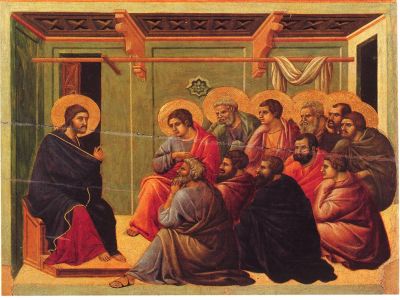Curious Cases - Fourteenity, I AM...
- Details
- Category: Do we know What we worship?

1) We studied about God Almighty and Jesus Christ, and also explored questions on Co-Equality and Co-Eternity. We learnt about the Holy Spirit too. And we did find the straightforward non-conflicting meaning of John 1:1. Now let us study some other scriptures that get cited by Trinitarians.
For instance, John 14:9 and 10:30 - What do these verses mean?
-
John 14:9 - ‘he who has seen me has seen the Father’.
Sometimes this is used to support an extreme theory (deviant from the Trinitarian Creed itself) that Jesus is the Father. But what really did Jesus mean by this statement? Actually after he said this, he goes on to explain how they see the Father in him - Through the Father’s words that Jesus spoke and the works he did by the Father's power (14:10-11). The people see the Father in Jesus by listening to his message and by seeing him work by the Father's power. -
John 10:30 – ‘I and the Father are one’
When Jesus says this, some of his Jewish listeners think he claims to be God. The irony here is that Jesus had just said, ‘My Father, who has given them to me, is greater than all’ (10:29). After their accusation, he reminds them of Psalms 82:6 that reads ‘I said, ‘You are ‘gods’; you are all sons of the Most High' and asks, ‘Why then do you accuse me of blasphemy because I said, 'I am God's son'?’ (10:33-36).
If anyone uses John 10:30 to claim Jesus is God, then they make the same error some of the Jews made then, ignoring Jesus’ explanation that he was God’s son and that they too can be gods (mighty beings) one with God as his sons.
Jesus mentions being one with God elsewhere, when praying for the disciples to be one in God like him. Yet no one claims the disciples are part of a ‘Fourteenity’ of God Persons, do they?
‘that they may be one as we are...that they all may be one; as thou, Father, art in me, and I in thee, that they also may be one in us..’ (John 17:11, 21 KJV).
Clearly being one means being one in thought, purpose and deeds.
2) What about Matthew 28:19 that talks about baptizing in the name of the Father, Son and the Holy Spirit?
Trinitarians argue that since all have one name, it supposedly means all are one. But the problem is, it self-contradicts the Trinitarian Creed which says ‘the three persons should not be confounded’ - Calling the three by one name does indeed confound them.
There’s a better explanation. Anyone studying Jewish culture (and other ancient cultures) would realize that the phrase ‘in the name’ meant ‘by the authority of’ during those times. Eg. ‘In the name of the king’ meant ‘by the king’s authority’.
That’s what Matthew 28:19 means – by the authority of the Father, Son and the Holy Spirit.
3) What about John 8:58 where Jesus says, ‘before Abraham was born, I am’?
Some try to argue that Jesus uses ‘I AM’ (present tense) referring to God in Exodus 3:14 and that’s why some of the Jews there tried to stone him (8:59). But when we study these verses, we see there isn’t much correlation between the Greek John 8:58 and the Hebrew Exodus 3:14.
- Hebrew scholars say Exodus 3:14 is better translated as ‘I WILL BE WHAT I WILL BE’ (NIV footnote).
- And John 8:58 has a special Greek present tense ‘I HAVE BEEN’ - Present of Past Action Still in Progress, defined as, ‘The present tense may be used to describe an action which, begun in the past, continues in the present. The emphasis is on the present time…The key to this usage is normally to translate the present tense as an English present perfect’ (Source: Wallace, Greek Grammar Beyond the Basics).
So John 8:58 could be, ‘before Abraham was born, I have been’ (We see the same grammar applied in many other places – Luke 13:7, 15:29, 1John 3:8, Acts 27:33 etc.). Jesus was essentially saying he has existed way before Abraham and that's how he had seen him (8:57).
And some Israelites trying to stone him was not any sudden reaction, as he says much earlier they’re already trying to kill him (8:37, 40).
4) What about the Godhead mentioned in the King James Bible (Acts 17:29, Romans 1:20, Colossians 2:9)?
Today this word conjures up images of a 3-person head. But the Middle English suffix ‘head’ was used in the same sense as ‘hood’ (Sample: maidenhead). So it’s Godhood.
And we find the root Greek words just mean divine nature/deity.
So godhead is not found in reputed translations (NIV/NASB etc.).